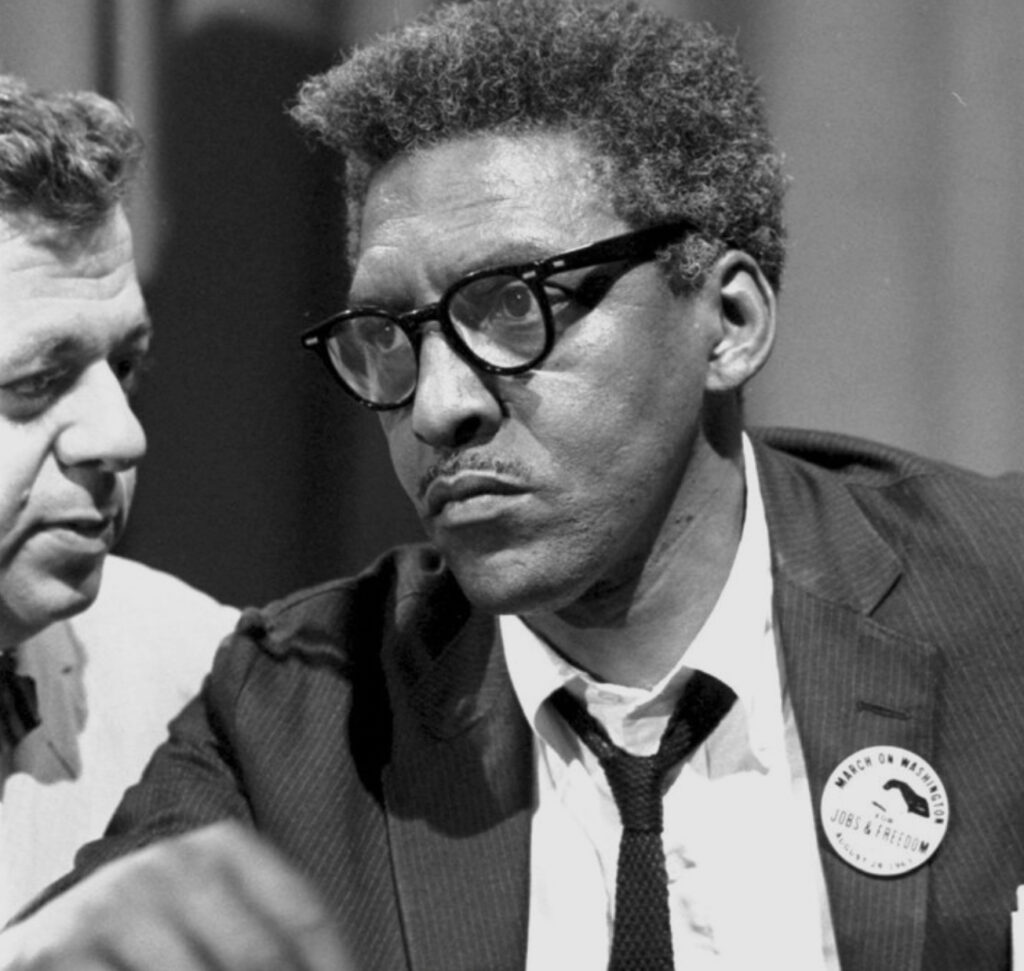(Extended Exploration of His Life and Legacy) Bayard Rustin (1912–1987) stands as one of the most influential yet often overlooked figures in the American civil rights movement. A master strategist, organizer, and advocate for nonviolent resistance, Rustin’s contributions to social justice and human rights have left an indelible mark on history. From his pivotal role in organizing the 1963 March on Washington for Jobs and Freedom to his international activism against racism and oppression, Rustin’s life was a testament to the power of collective action and perseverance. This essay delves into Rustin’s life, his contributions to the civil rights movement, the challenges he faced, and the enduring legacy he leaves behind.
Early Life and Influences
Bayard Rustin was born on March17, 1912, in West Chester, Pennsylvania. Raised by his grandparents, Julia and Janifer Rustin, he grew up in a Quaker household that emphasized pacifism, equality, and social justice. These early values deeply influenced Rustin’s worldview and shaped his lifelong commitment to nonviolence.
Rustin’s identity as a Black man and as a gay man further shaped his understanding of systemic oppression. He faced discrimination on multiple fronts, but he channeled these experiences into his activism. Rustin’s early exposure to the works of Mahatma Gandhi and his participation in the Young Communist League further solidified his belief in nonviolent resistance as a tool for social change.
A Pioneer of Nonviolent Resistance
Rustin’s commitment to nonviolence was not just theoretical; it was deeply practical. In the 1940s, he joined the Fellowship of Reconciliation (FOR), an interfaith organization dedicated to peace and justice. As a leader in FOR, Rustin helped organize the Journey of Reconciliation in 1947, a precursor to the Freedom Rides of the 1960s. This interracial bus ride through the segregated South challenged the enforcement of the Supreme Court’s decision in Morgan v. Virginia, which outlawed segregation in interstate travel.
Rustin’s expertise in nonviolent resistance caught the attention ofDr. Martin Luther KingJr. in the mid-1950s. Rustin became a close advisor and mentor to King, teaching him the principles of Gandhian nonviolence and helping him refine his strategic approach to activism. Rustin’s influence was critical in shaping the Montgomery Bus Boycott (1955–1956) and the founding of the Southern Christian Leadership Conference (SCLC) in 1957, which became a cornerstone of the civil rights movement.
The 1963 March on Washington: A Masterstroke of Organizing
Perhaps Rustin’s most enduring legacy is his role as the chief organizer of the 1963 March on Washington for Jobs and Freedom. This historic event brought over 250,000 people to the nation’s capital and culminated inDr. King’s iconic “I Have a Dream” speech.
Rustin’s organizational genius was evident in every detail of the march. He coordinated logistics, negotiated with government officials, and built a coalition of diverse civil rights organizations, labor unions, and religious groups. His ability to unite these factions under a common goal demonstrated his exceptional leadership and strategic acumen. The march not only amplified the demands for civil rights legislation but also showcased the power of peaceful protest to the world.
Global Activism and Social Justice Advocacy
Rustin’s activism extended far beyond the United States. He traveled to India to study Gandhi’s methods firsthand and worked in England and West Germany to promote peace and human rights. In Africa, he supported movements against colonialism and apartheid, advocating for the rights of oppressed peoples worldwide.
Rustin was also a vocal opponent of nuclear weapons and war. During the Cold War, he spoke out against the arms race and called for disarmament, aligning his pacifist beliefs with his broader vision of global justice.
Facing Discrimination: The Challenges of Being Openly Gay
Despite his immense contributions, Rustin faced significant challenges due to his sexuality. As an openly gay man in an era of widespread homophobia, he was often marginalized within the civil rights movement. Critics used his sexuality to discredit his work, and he was forced to operate behind the scenes on many occasions.
Rustin’s arrestin 1953 on charges related to homosexuality was used against him by political opponents, leading to his temporary distancing from prominent leadership roles. However, Rustin refused to be silenced. He continued to advocate for social justice, and later in life, he became an outspoken advocate for LGBTQ+ rights, emphasizing the intersectionality of struggles for equality.
Later Years and Continued Advocacy
In the 1970s and 1980s, Rustin shifted his focus to economic justice and human rights. He became a vocal supporter of labor unions and worked to address issues of poverty and inequality. Rustin also criticized the rise of identity politics, arguing that coalition-building across racial and ideological lines was essential for achieving lasting social change.
Rustin’s later years were marked by his tireless advocacy for global human rights. He spoke out against apartheid in South Africa and supported democratic movements in Africa and Asia. His commitment to justice remained unwavering until his deathin 1987.
Bayard Rustin’s legacy is one of courage, resilience, and unwavering dedication to justice. His contributions to the civil rights movement, his advocacy for nonviolence, and his ability to inspire collective action have left an indelible mark on history. Today, Rustin is increasingly recognized as a central figure in the struggle for civil rights, with efforts to honor his memory through awards, scholarships, and historic recognitions.
In 2013, President Barack Obama posthumously awarded Rustin the Presidential Medal of Freedom, the nation’s highest civilian honor, acknowledging his pivotal role in shaping the course of American history. Organizations and activists continue to draw inspiration from Rustin’s life and work, applying his principles of nonviolence and coalition-building to contemporary struggles for justice.
In the words of Rustin himself: “We need, in every community, a group of angelic troublemakers.” Bayard Rustin embodied this spirit, and his legacy challenges us to be troublemakers for justice in our own time.
No comments yet.








